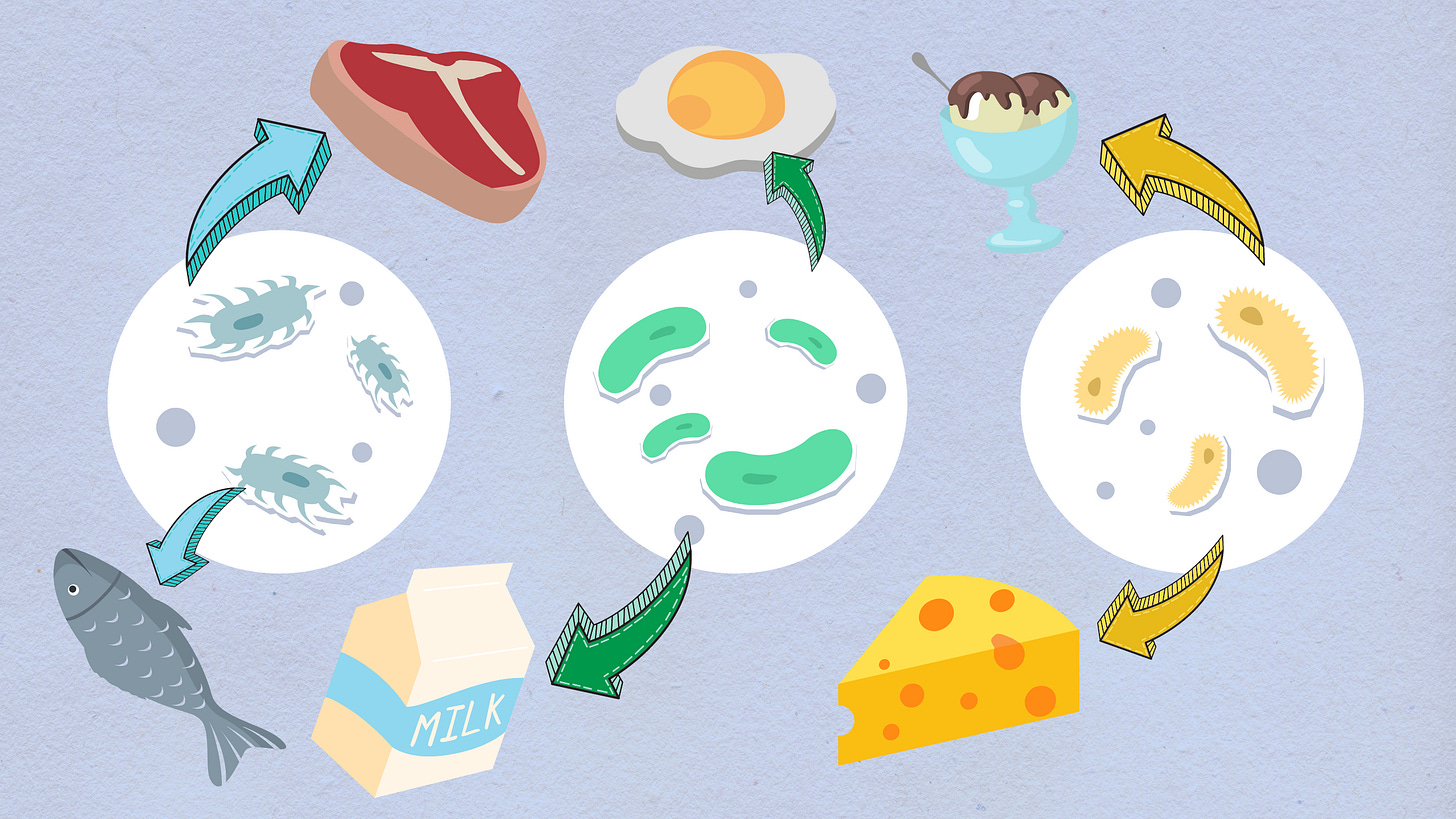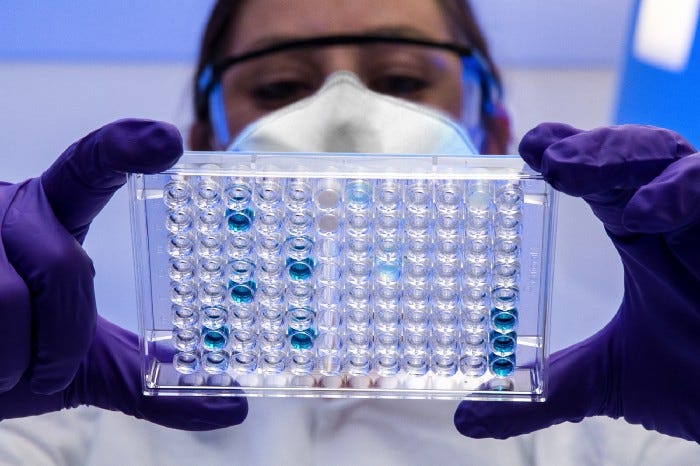Using Microbes as Factories to Produce Animal-Free Ingredients
Making milk with bacteria while sparing the cow.
To promote ethical and sustainable practices, the food industry needs a significant overhaul. Precision fermentation is a popular solution that involves using genetically modified microorganisms such as bacteria, yeast, and algae to produce specific functional ingredients. (Further reading: The Future of Protein: A Look at 3 Alternative Protein Sources)
This is not a new technology. It has been safely used for more than 30 years and is already present in various everyday products. In fact, the food industry widely employs this technology to create products such as vitamin B2, lipase, chymosin enzymes, and flavoring agents.
For instance, chymosin, a crucial enzyme used in cheese production, is now produced on a large scale through fermentation instead of being extracted from cows’ stomachs. Since the 1980s, 90% of processed cheeses in the US have been made using commercialized fermentation-derived chymosin created using genetically engineered E. coli. Moreover, this method has the advantage of being kosher and halal-approved.
Steps of precision fermentation
Finding the specific ingredient that is intended for production. E.g., whey proteins, egg whites, and heme.
Decide which microorganism is best suited to produce the desired component. E.g., bacteria, yeast, or algae.
To manufacture the desired component, the targeted microorganism must be genetically modified using methods like gene editing, cloning, or CRISPR.
The genetically modified microorganisms are cultivated in large tanks with ideal growth conditions for the production of the desired ingredient.
The desired component is produced by microorganisms and then purified through the harvesting and purification process.
The benefits of precision fermentation
1. Sustainability
Precision fermentation presents a more sustainable path forward for food production, offering a solution to the environmental challenges of animal agriculture.
The traditional agricultural model currently allocates nearly 50% of inhabitable land to farming, with an astounding 77% of that going to animal farming. This system, responsible for a third of global greenhouse gas emissions and significant biodiversity loss, cannot support a rapidly growing population.
Precision fermentation, on the other hand, has the potential to reduce greenhouse gas emissions by up to 96% and use 99% less land and 96% less water than conventional meat production while requiring 45% less energy. In fact, research indicates that precision fermentation using methanol can achieve this with 1,700 times less land than the most efficient traditional agricultural methods.
Furthermore, this technology can produce bio-identical milk proteins, such as casein or whey, with even lower land and water inputs. By requiring significantly fewer resources and producing less waste, precision fermentation is a more sustainable option for the future of food production.
2. Customization
Almost any ingredient can be produced in large quantities using precision fermentation. Normally, these ingredients are found only in animal products, so precision fermentation opens the door to the production of incredibly specific ingredients that can be used to create animal-free products that mimic the flavor and texture of products made from animals. As it can be challenging to produce meat and dairy alternatives using conventional plant-based components, this level of customization is essential for the alternative protein industry.
By creating plant-based products that closely mimic the taste and texture of animal-based products, consumers no longer have to compromise on taste or texture when choosing ethical and sustainable food options. By offering plant-based alternatives that are just as satisfying and delicious as their animal-based counterparts, we can encourage more people to make the switch to ethical and sustainable food options.
3. Food security
Precision fermentation produces food ingredients in a controlled environment. This allows for the efficient production of specific proteins, lipids, vitamins, enzymes, pigments, and more using microbes, as well as eliminating the need for animal farming and thus reducing the danger of some animal-borne diseases.
Unlike traditional agriculture, which is subject to external conditions such as the weather and other factors, precision fermentation can be carried out in a lab or manufacturing facility 24/7, 365 days a year. This will contribute to food security by providing a more reliable and consistent supply of food products, especially in areas where traditional agriculture is vulnerable to drought, flooding, and other weather-related disasters.
Additionally, precision fermentation has the potential to reduce food waste, which is a significant contributor to hunger, with almost a third of all food produced every year being wasted or lost. By producing food ingredients in a more controlled environment, the amount of food waste that occurs during production and transportation can be reduced.
4. Ethical considerations

Precision fermentation offers a more ethical approach to food production, as it eliminates the need for animal agriculture, which involves the exploitation and mistreatment of animals.
Precision fermentation is revolutionizing the food industry not just by offering a sustainable and cost-effective approach to food production but also by providing a more ethical solution to traditional animal agriculture. Animal agriculture has long been criticized for its harmful environmental impact and inhumane treatment of animals. By replacing animal-based products with precision fermentation-based alternatives, we can significantly reduce animal suffering while still meeting our food needs.
As stated in one of my previous articles: “…the rampant use of antibiotics and hormones in dairy farming not only poses a threat to the environment and human health but also causes significant harm to the cows. Over-milking can lead to udder health issues such as mastitis and lameness while confining cows to cramped spaces deprives them of their natural behaviours and exacerbates their suffering.” (Further reading: 4 Key Reasons for the Surging Popularity of Plant-Based Milk)
Precision fermentation eliminates this problem, as it allows us to produce meat and dairy alternatives without the need for raising and slaughtering animals. This means that animals are no longer exploited or mistreated for the sake of food production.
Thank you for taking the time to read this article! If you found it informative and interesting, consider checking out my blog where you can find more articles!
References:





Precision fermented milk proteins are not yet conclusively less environmentally impactful than cow-derived ones.
Largely dependent on production facilities electricity supply. Suggests that this technology could be PART of a solution but realistically should not yet be considered as such.
https://doi.org/10.1007/s11367-022-02087-0